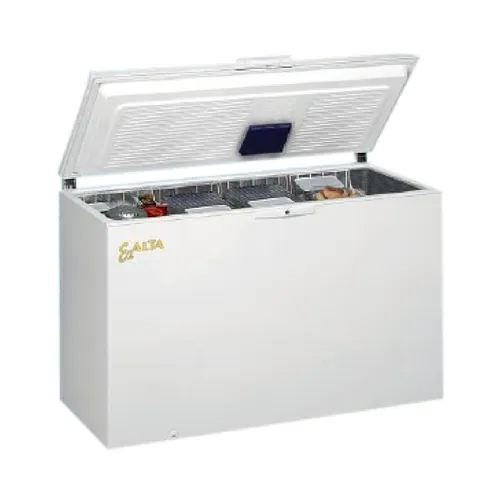Exalta White 100L Solar Deep Freezer, 568x560x825mm
₹35,000.0 / Unit
Product Specification
| Product Dimensions | 568x560x825mm |
| Capacity | 100L |
| Color | White |
| Brand | Exalta |
| Model Name/Number | EXAL_DF100L |
| Body Material | Stainless Steel |
| Weight | 31kgs |
| Power Consumption | 150 watt |
| Input Voltage | 24V DC |
| Battery Input | 24V 150Ah |
| Solar Input | 300 watt |
| Loading Quality | 80 bottles Apx (1L) |
- Description
- Additional information
- Reviews (0)
- Q & A
- Sustainability Remark
- More Offers
- Store Policies
- Inquiries
Product Description
The phenomenon of conversion of energy makes the use of solar products very interesting to utilize. Exalta solar deep fridge (ESDF) runs on 200 watts of solar panel and 75 AH of battery. One needs not to become an accountant to manipulate the daily expense in order to spare the place for bill payments.
It comes in white colour mainly. It has inbuilt charge controller. 4 wires will come along; two of them need to be attach with battery and other two with solar panel, this way both will connect together.
Temperature can be set between 4 °C to -20° C. Preserving food to vaccines and medicines will all become very convenient to store for longer period of time.
| brands | Exalta |
|---|
You must be logged in to post a review.
Q & A
Solar freezers are a type of refrigeration unit that uses solar power to cool and preserve food and other perishable items. They have the potential to be more sustainable than traditional freezers that rely on grid electricity because they use renewable energy and have no associated greenhouse gas emissions.
The sustainability of solar freezers depends on several factors, including the materials used to manufacture them, the energy required to produce and transport them, and their durability and lifespan. Ideally, solar freezers should be made from sustainable materials, such as recycled plastics or renewable materials like bamboo, and should be designed to last for many years with minimal maintenance.
Another important consideration is the efficiency of the solar panels that power the freezer. High-quality, efficient solar panels can maximize the amount of energy that is captured from the sun and minimize the amount of energy that is lost due to inefficiencies.
The sustainability of solar freezers also depends on the local climate and the availability of sunlight. In areas with low levels of sunlight or frequent cloudy days, solar freezers may not be a viable option, and other forms of refrigeration may be necessary.
Finally, the sustainability of solar freezers depends on the availability and accessibility of repair and maintenance services. If a solar freezer breaks down or requires maintenance, it should be possible to repair it without the need for costly replacement parts or specialized knowledge.
Overall, solar freezers have the potential to be a sustainable option for refrigeration, but their sustainability depends on several factors and careful consideration of these factors is necessary to ensure their environmental and social impact is positive.
General Inquiries
There are no inquiries yet.

















Reviews
There are no reviews yet.